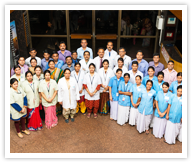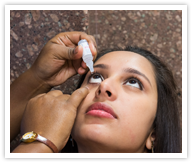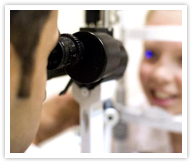Eye Care Tips
Eye Health Tip 1: Wear UV Protection in Sunglasses and Eyeglasses
Yes, you've heard this tip many times. But do you know why ultraviolet (UV) protection in eyeglass lenses is so essential for maintaining healthy eyes?
UV protection is needed because the sun produces a type of invisible energy known as ultraviolet radiation, which can create some serious health effects due to over-exposure. We already know that skin should be protected to prevent sunburn and accompanying damage that might lead to cancer.
But eyes, too, require extra protection to prevent UV-related damage to internal eye structures such as the cornea, crystalline lens, and retina. This eye damage, particularly over a long period of time, may be related to development of the potentially blinding disease of macular degeneration and to eye diseases such as clouding of the eye's natural lens (cataracts).
Eye Health Tip 2: Wear Sunglasses and Broad-Brimmed Hats in Bright Sunlight
Wearing sunglasses and hats also helps protect your eyes from potentially damaging ultraviolet light associated with bright sunlight, which can lead to eye diseases such as cataracts and macular degeneration.
Eye Health Tip 3: Practice Good Hygiene if You Wear Contact Lenses
Many contact lens wearers don't realize that bad hygiene can lead to some very scary and, in fact, blinding complications caused by spread of bacterial infection into delicate structures of your eye, including the optic nerve essential for sight.
Practice good hygiene by making sure lenses are cleaned with proper solutions, and by following manufacturer guidelines about how to store lenses. Also, make sure you discard disposable lenses in a timely way according to manufacturer recommendations.
Eye Health Tip 4: Wear Appropriate Safety Glasses or Other Eye Protection for Work or Play
Check this U.S. Centers for Disease Control web site for specific tips about certified industrial grade goggles and eye shields appropriate for various trades, including welding.
The U.S. Occupational Safety and Health Administration (OSHA) also lists detailed guidelines regarding eye protection in specific work environments.
Also make sure your eyes are protected if you engage in certain sports. Eye trauma, which also can be potentially blinding, often is related to impact from balls moving at high velocity such as baseballs.
Eye Health Tip 5: Eat Green, Leafy Vegetables and Foods Rich in Antioxidants
Findings from a highly respected, major scientific study known as the Age-Related Eye Disease Study (AREDS), funded by the National Eye Institute, strongly suggest that a diet rich in green, leafy vegetables and foods containing antioxidants such as fruits, sweet potatoes, etc. can help maintain eye health and even slow or prevent development of a potentially blinding eye disease, macular degeneration.
Note: Positive effects shown in the scientific study resulted from high levels of beneficial nutrients contained in specifically formulated supplements.
Poor nutrition also has been linked to development of other eye diseases, such as toxic amblyopia causing damage to the optic nerve.
Eye Health Tip 6: Don't Smoke
Smoking is an underlying factor in the development of serious eye diseases including macular degeneration and glaucoma.
Eye Health Tip 7: Engage in Regular Aerobic Exercise
Scientific evidence increasingly indicates that the boost in heart rate and blood circulation accompanying aerobic exercise can help maintain the health of crucial eye structures, such as the optic nerve that transmits images from the eye to the brain.


















